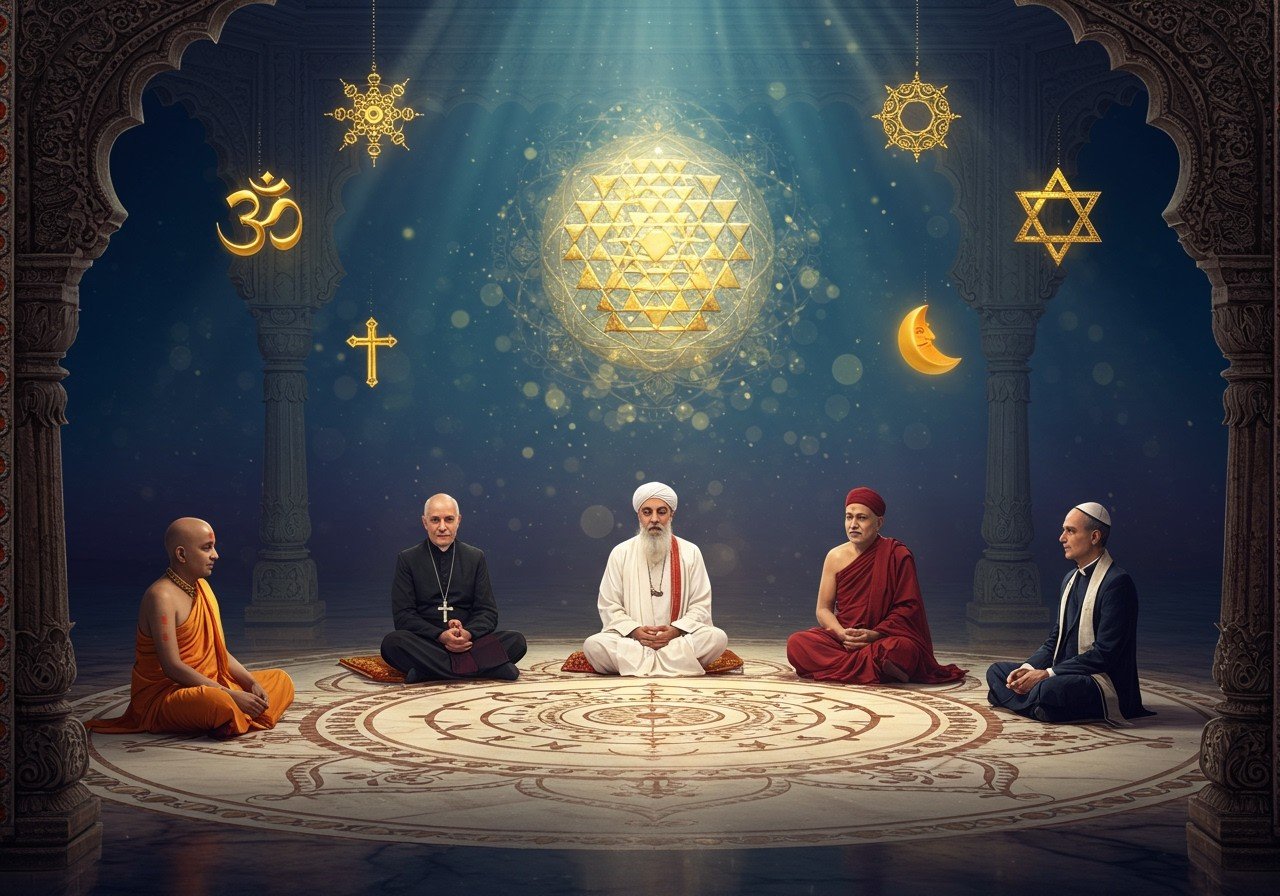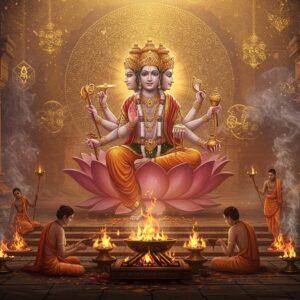
In Indian society, religious leaders hold immense cultural and spiritual importance. They guide rituals, maintain traditions, and enrich the community’s spiritual life. Understanding the nuances between titles like Pandit, Brahmin, Purohit, and Shastri helps us appreciate their unique roles within our rich cultural heritage. Knowing these distinctions is especially valuable for those who cherish tradition and prefer authentic religious practices.
Pandit vs Brahmin
The terms Pandit and Brahmin are often used interchangeably, but they represent distinct concepts. Brahmin refers to a caste within the Hindu varna system, traditionally associated with priestly and scholarly duties. A Pandit, on the other hand, is a learned scholar, particularly in Vedic scriptures and Hindu rituals. While many Pandits belong to the Brahmin caste, individuals from other castes can also earn the title of Pandit through dedicated study and practice. Over time, “Pandit” has even come to signify expertise in fields beyond religion, reflecting the title’s broader recognition of knowledge and skill.
Pandit vs Purohit
Religious ceremonies are deeply woven into the fabric of Indian life. Knowing the difference between a Pandit and a Purohit helps one choose the right spiritual guide for specific needs. A Purohit serves as a family priest, performing rituals and ceremonies for a particular family or community, often across generations. This role involves a close, personal bond, with the Purohit acting as a spiritual advisor and counselor. They oversee significant life events like weddings, birth ceremonies, and ancestral rites, providing a reassuring presence throughout a family’s spiritual journey.
Pandits, conversely, are generally itinerant priests or scholars who may perform rituals for various families. They aren’t tied to a single group and might travel to different locations to conduct ceremonies. Pandits possess deep knowledge of Vedic scriptures and are sought after for their expertise in specific rituals or festivals. While they may not form long-term relationships with individual families, their extensive experience makes them adept at performing rituals across different cultural contexts. Regional variations influence how these titles are used; in some areas, the lines between Pandit and Purohit may be blurred, reflecting local customs and traditions. For instance, in North India, the term “Pandit” often encompasses both roles.
Shastri vs Pandit
The titles Shastri and Pandit represent distinct levels of scholarship within Hinduism. A Shastri is an individual who has mastered the Shastras—ancient Indian texts and scriptures. This title denotes a high level of academic accomplishment and a profound understanding of religious doctrines. Shastris often dedicate themselves to teaching and preserving scriptural knowledge, passing down the wisdom of the sacred texts to future generations. They play a critical role in interpreting complex religious concepts and participating in scholarly discussions.
Pandits, while also learned in the Shastras, may not necessarily hold the title of Shastri. They may not have reached the same depth of scriptural expertise but often focus on practical religious duties such as performing rituals, conducting community events, and providing spiritual guidance. They act as a bridge between the scholarly world of the Shastras and the lived experiences of everyday religious practice. Each title contributes uniquely to the preservation and transmission of Hindu knowledge. Shastris focus on academic and textual study, while Pandits ensure that traditional practices continue to thrive in daily life.
Cultural Significance and Modern Roles
In contemporary India, these religious titles continue to hold significance while adapting to modern realities. Globalization and technology have influenced traditional roles, with many Pandits, Purohits, and Shastris now offering services online. This allows them to reach wider audiences, transcending geographical boundaries, and ensuring the continuity of ancient practices in the digital age. This shift represents a harmonious blend of tradition and modernity, preserving cultural heritage while embracing technological advancements. The growing demand for authentic ritual items online reflects a desire to maintain traditional practices while enjoying the convenience of modern shopping. These roles play a vital part in maintaining cultural continuity, offering guidance and support to those seeking to honor traditions within a rapidly evolving world.
At poojn.in, we understand the significance of these roles in our rich spiritual heritage. That’s why we offer a wide selection of authentic puja items, from divine idols to sacred ritual accessories, to help you create a truly blessed atmosphere in your home. Explore our collection and experience the convenience of finding everything you need for your spiritual practices in one place.
Comparison of Ritual Practices
Delving into the specific rituals performed by each title deepens our understanding of their roles. Pandits conduct a wide range of ceremonies, such as pujas, havans (fire rituals), and festivals. Their broad expertise allows them to adapt these rituals to diverse community needs. Purohits focus more on family-specific ceremonies, preserving and passing down traditions through generations. Their close connection with families creates a deeply personal element within the rituals. Shastris, while primarily focused on academic study, may also oversee rituals demanding deep scriptural knowledge. They ensure ceremonies adhere to the teachings of ancient texts. These practices vary across different regions of India, showcasing our nation’s incredible cultural diversity. Despite modern influences, these rituals continue to safeguard the essence of traditional Indian spirituality.
How Poojn.in Supports Your Spiritual Needs
Poojn.in provides easy access to verified Pandits and religious experts, assisting you with a range of spiritual services and consultations. We offer:
- Online Pandit Consultations: Connect directly with qualified Pandits through video consultations for guidance on muhurats, astrology, and religious ceremonies. Receive expert advice tailored to your specific needs and concerns.
Looking for personalized guidance on auspicious timings or astrological insights? Our online Pandit consultations offer direct access to qualified experts via video calls, providing tailored advice and support for your spiritual journey. - Religious Items for Ceremonies: Find complete puja samagri kits for various ceremonies, ensuring you have everything required for a sacred and authentic experience. We guarantee the quality and authenticity of all our ritual items, giving you peace of mind.
From meticulously curated puja kits to individual items, we source authentic materials to ensure the sanctity of your ceremonies. Experience the convenience of online shopping while upholding the traditional values of your practices. - Easy Booking Services: Book services with a streamlined online process, transparent pricing, and access to verified Pandit profiles, complete with credentials. Easily find and book the services you need with our user-friendly platform.
- Dedicated Customer Support: Reach us via phone (03369029784), WhatsApp (9476142738), or email for prompt assistance with your queries and concerns. We are here to help you every step of the way. Our customer support team is readily available via phone, WhatsApp, and email to answer your questions and provide personalized assistance, ensuring a smooth and satisfying experience.
Related Products at Poojn.in:
- Puja thalis and accessories: Explore our exquisite collection of puja thalis and accessories, crafted with reverence and attention to detail, enhancing the beauty and sanctity of your worship space.
- Sacred threads and religious clothing: Discover our range of sacred threads and religious garments, imbued with traditional significance, allowing you to express your devotion and connect with your spiritual heritage.
- Ritual items for specific ceremonies: Find all the necessary ritual items for various ceremonies, carefully curated to ensure authenticity and completeness, simplifying your preparations and enhancing your spiritual experience.
- Havan samagri and ingredients: Browse our selection of havan samagri and ingredients, sourced with utmost care and purity, enabling you to perform sacred fire rituals with reverence and authenticity.
For personalized help with religious services or product recommendations, connect with our customer service team via WhatsApp or phone. We’re dedicated to providing authentic guidance and materials for all your religious needs. Browse our complete collection of religious items at Poojn.in today.
Conclusion: Embracing Tradition in the Modern World
In the rich tapestry of Indian spirituality, Pandits, Purohits, and Shastris play vital roles. Each title represents a unique contribution to the spiritual well-being of communities and families. Understanding the distinctions between these roles empowers us to make informed decisions about our spiritual guidance. As our world changes, these roles adapt, blending ancient wisdom with modern practices. Whether you seek a Purohit’s personalized guidance, a Pandit’s versatile expertise, or a Shastri’s scholarly insights, each plays a crucial role in preserving our cultural heritage. At poojn.in, we honor these traditions by providing access to authentic products and services that support your spiritual journey.
FAQs on Pandit vs. Other Religious Titles
Let’s address some common questions about these important religious roles:
What sets a Pandit apart from a Brahmin? A Pandit is a scholar or teacher, often performing rituals and teaching scriptures. A Brahmin is a member of the Hindu priestly caste. While many Pandits are Brahmins, not all Brahmins serve as Pandits. The distinction lies in the active practice of religious scholarship and ritual performance.
How does a Pandit’s role differ from that of a Purohit? A Pandit focuses on teaching and scholarly work, while a Purohit primarily performs religious ceremonies and rituals, often serving specific families for generations. A Purohit develops a deep, personal connection with the families they serve.
What roles do Shastris play in comparison to Pandits? Shastris are experts in the Shastras—ancient Indian texts—and often share similar duties with Pandits. However, their focus leans more towards scriptural knowledge and interpretation, while Pandits might engage more actively in ritual performance.
Can a Pandit perform all types of Hindu rituals? Generally, Pandits are knowledgeable about various Hindu rituals. However, specific expertise can vary based on individual training and specialization. Some Pandits may specialize in certain types of pujas or ceremonies.
Is a Pandit essential for conducting religious ceremonies? While a Pandit is highly recommended for accuracy and adherence to tradition, some simpler rituals can be performed by family members. A Pandit’s guidance ensures correct execution and adds depth to the spiritual experience.
Do Pandits and Purohits have different educational backgrounds? Both Pandits and Purohits study Vedic texts. However, Pandits often pursue further education with a scholarly focus, while Purohits may focus more on practical training for performing rituals.
Are Shastris considered superior to Pandits? Not necessarily. Each title represents a different area of expertise. Shastris specialize in scriptural knowledge, while Pandits focus on teaching and rituals. Both roles hold respected positions within Hindu tradition.
Why is understanding these distinctions important in the modern era? As traditions adapt to our times, understanding the nuances between Pandit, Purohit, and Shastri allows individuals to make informed choices about their spiritual and ritual needs. This knowledge helps preserve our cultural heritage while navigating a complex world.


